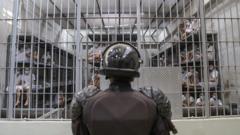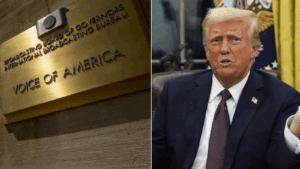In a significant legal intervention, the US Supreme Court has temporarily halted the deportation of a group of Venezuelan detainees held in Texas. These individuals are allegedly connected to a gang and were being processed for removal under the 18th-Century Alien Enemies Act. This law, which grants the president authority to detain and deport individuals from "enemy" nations without the usual legal procedures, was invoked by the Trump administration amidst heightened immigration enforcement.
US Supreme Court Intervenes to Halt Deportation of Venezuelan Detainees

US Supreme Court Intervenes to Halt Deportation of Venezuelan Detainees
The Supreme Court's latest ruling pauses the controversial deportation of alleged Venezuelan gang members under a contentious historic law.
The action from the Supreme Court follows a lawsuit filed by the American Civil Liberties Union (ACLU), which claims that the detainees were not given a fair opportunity to contest their deportation orders. The group argues that many detainees received sudden deportation notices in English, which was detrimental to those who only speak Spanish. The ACLU's lawsuit emphasized that without the Court’s intervention, individuals faced the possibility of life-altering consequences without the chance to defend themselves in a legal setting.
Initially, the Supreme Court permitted the use of the Alien Enemies Act for deporting individuals like those tied to the Tren de Aragua gang, which has been accused of threatening US national security. However, the Court's latest ruling underscores the legal requirement to afford detainees the right to challenge their deportations in court. Out of the 261 Venezuelans deported to El Salvador, 137 were processed through this contentious act.
Dissenting opinions were voiced by Justices Clarence Thomas and Samuel Alito during the ruling. Meanwhile, this legal move comes in the wake of the Trump administration's aggressive stance on immigration and a commitment made by Trump during his inauguration to eliminate foreign criminal gangs from US soil.
Meanwhile, cases like that of Kilmar Ábrego García, an individual mistakenly deported to El Salvador after being detained as a gang member despite having no criminal record, raise larger questions about the implementation of the policies surrounding immigration and deportation. The Supreme Court has ruled for the government to return García, but the administration maintains he will not be readmitted to the US. As advocates like Senator Chris Van Hollen highlight the dire conditions in detention facilities, the ongoing debate over deportation processes and detainee rights remains a pivotal issue in American immigration policy.
Initially, the Supreme Court permitted the use of the Alien Enemies Act for deporting individuals like those tied to the Tren de Aragua gang, which has been accused of threatening US national security. However, the Court's latest ruling underscores the legal requirement to afford detainees the right to challenge their deportations in court. Out of the 261 Venezuelans deported to El Salvador, 137 were processed through this contentious act.
Dissenting opinions were voiced by Justices Clarence Thomas and Samuel Alito during the ruling. Meanwhile, this legal move comes in the wake of the Trump administration's aggressive stance on immigration and a commitment made by Trump during his inauguration to eliminate foreign criminal gangs from US soil.
Meanwhile, cases like that of Kilmar Ábrego García, an individual mistakenly deported to El Salvador after being detained as a gang member despite having no criminal record, raise larger questions about the implementation of the policies surrounding immigration and deportation. The Supreme Court has ruled for the government to return García, but the administration maintains he will not be readmitted to the US. As advocates like Senator Chris Van Hollen highlight the dire conditions in detention facilities, the ongoing debate over deportation processes and detainee rights remains a pivotal issue in American immigration policy.























